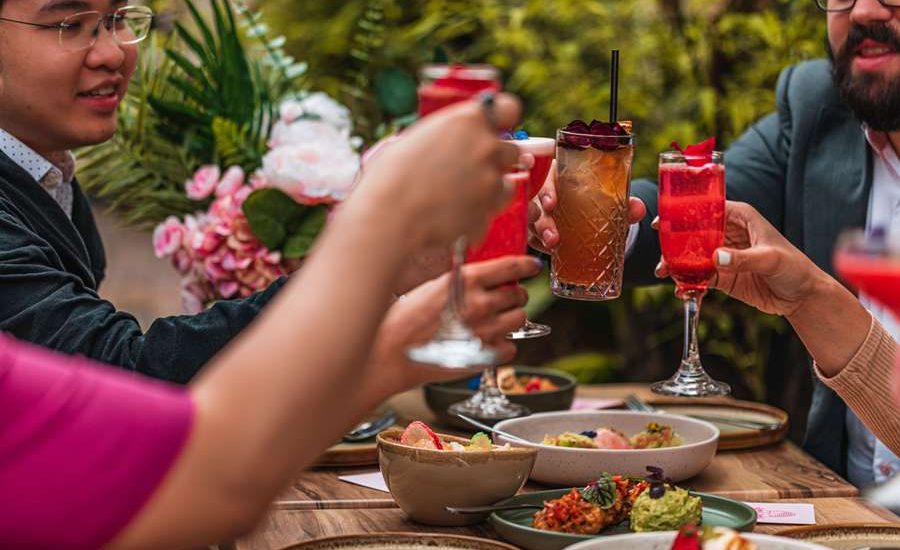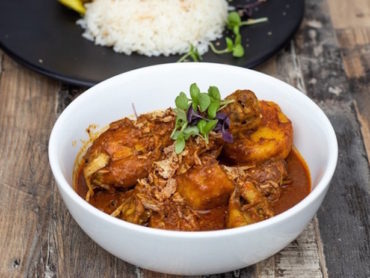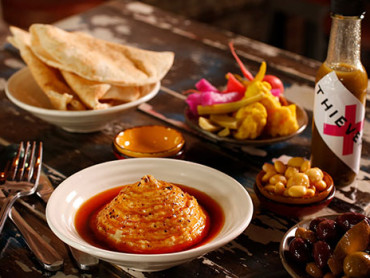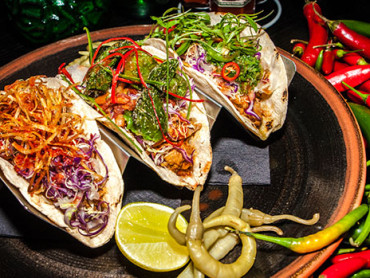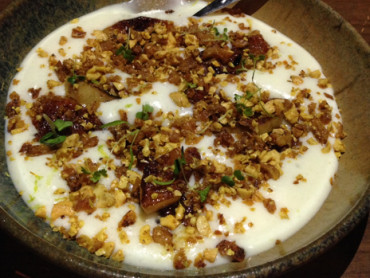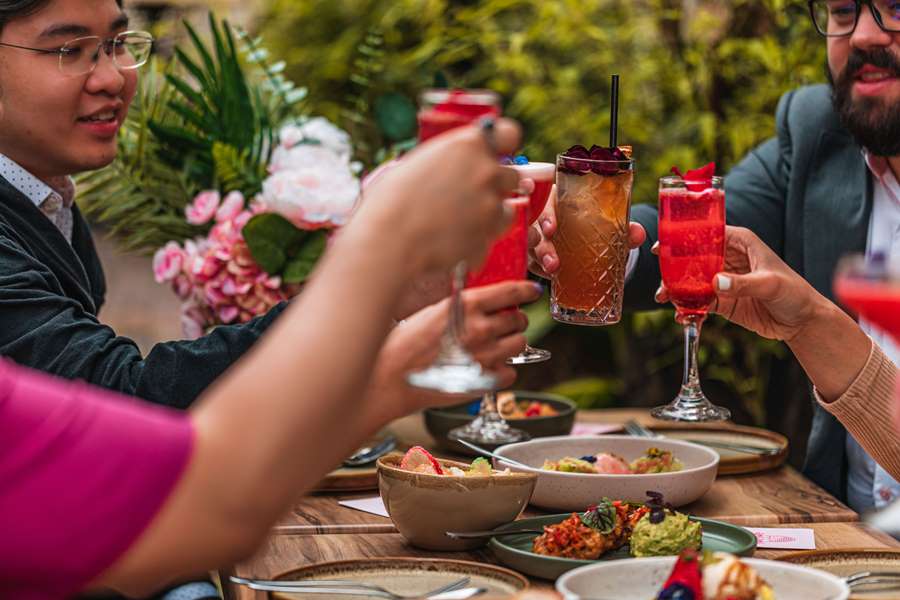
It’s hard not to be transported back to memories of Bali, Sumatra and Indonesia as we sit with an ice cold Bintang in one hand, a plate of Sate Ayam by the other. The sun is shining (yes really after all this rain…) and we have the perfect shady spot on the terrace to people watch.
Except, we have not Jetstar-ed away.. we are in Glebe. At a hidden spot many would walk past and not even know the jems inside. Salt & Palm opened in 2018. It’s a beautiful stone cottage perched above Glebe Point Road. Inside, the interior is a tropical oasis from the peacock timber clad walls, banana palm murals, wooden furniture and shadows cast from rattan hanging lights. The back garden is an calming space of green, fernery and spiritual offerings.
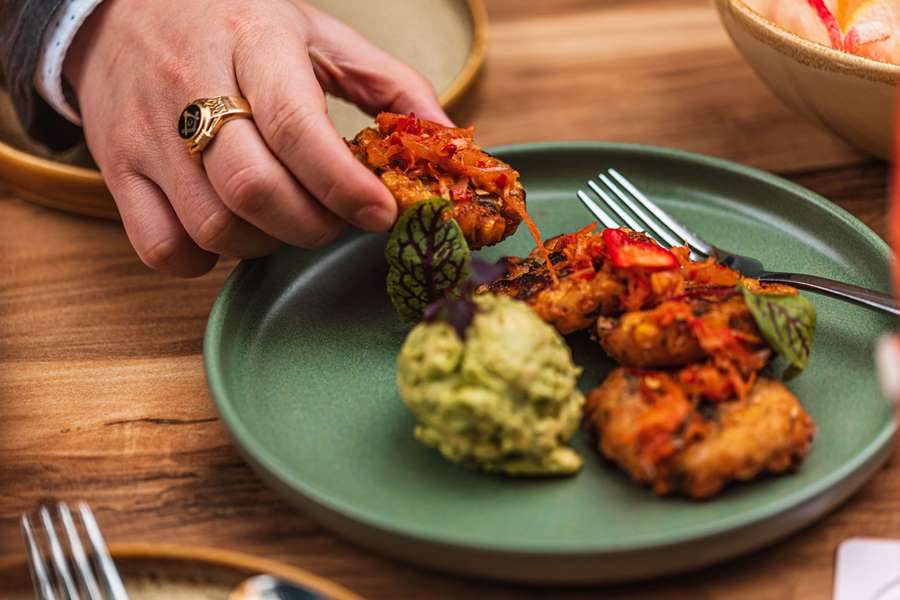
Executive Chef and General Manager Natasya Soetantyo takes us on a journey which encompasses Balinese, Javanese and Chinese Indonesian cuisines. We kick off with the Brunch Menu. A plate of corn fritters arrives. Oh my! They are look addictive…and are! Three golden circles sit on top of a bananna leaf dotted with spicy Balinese chilli, eschallot, lemongrass relish and a quenelle of smashed avocado. The Jakarta style salad (Asinan Betawi) is a tower of red cabbage, cucumber, carrot tofu with crispy rice cakes and all tossed in tamarind dressing. Its nicely balanced sweet/sour and cripsy. Its our first time trying the traditional breakfast prawn egg noodle dish Mie Celor. Origniating from Palembang city in Sumatra Island its a comforting, soupy, creamy bowl of chilli, garlic and prawn stock with all elments being blanched not fried. It’s topped with a slow cooked 65c egg, prawns, chilli and garlic coconut cream sauce.
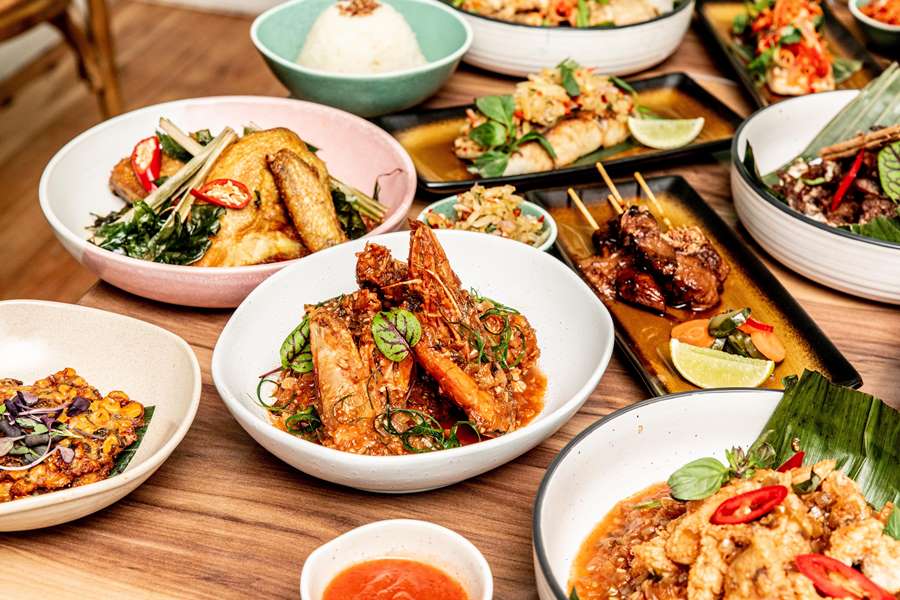
So with brunch ticked off, we are officially into lunch territory. Hello satay sticks! Sections of chicken are basted in sweet soy, threaded onto bamboo and char grilled with a covering of peanut sauce and housemade sambal. The hero dish is the vegan rendang. Soft chunks of plant-based mushroom-soy meat and potato are slow cooked with a chilli paste of galangal, cinnamon, ginger, lemongrass and coconut milk. It’s silky and rich with an acidity from the sambals. Two spoonfuls is not enough. We add a Balinese chicken cooked a spice paste of turmeric, chilli, garlic, lemongrass and shrimp paste. It’s a glorious bowl of silky chicken goodness, but we can’t help but keep talking about the corn cakes and the rendang as our obsessive dishes of the day!
This is food which represents the history of a generational family. It’s inspired by the handwritten recipes shared by her grandmother. We are the priviliged ones getting to experience the flavours of a home far away, but passed down through generations with love and enjoyed by us. That’s pretty special – and so is the experience.
See below for Gado Gado recipe shared by Natasysa.
Salt & Palm, 22 Glebe Point Road, Glebe, NSW 2037, Australia
Hours; Wed & Thurs 12:00pm – 3:30pm and 5:00pm – 9:00pm. Fri & Sat 12:00pm – 3:30pm & 5:00 – 9:30pm. Sun 12:00pm – 3:30pm & 5:00pm – 9:00pm
CASHEW-PEANUT SAUCE FOR GADO-GADO SALAD
By Natasya Soetantyo
Gado-gado salad is a salad originated from Jakarta. Sold in many street vendors, it’s basically a steamed vegetable salad doused with peanut sauce. Although normal peanuts are commonly used for the sauce, some vendors add a little bit of cashew to the peanut sauce to enhance the creaminess and the taste of the sauce. My version uses an equal amount of peanuts and cashews to really enhance the mouthfeel taste of the sauce.
Ingredients for Cashew Peanut Sauce:
Peanuts – unsalted without skin 225g
Cashews – unsalted and raw 225g
Water 450ml
Garlic, peeled, sliced 20g
Eschalot, peeled, sliced 40g
Chilli, long red variety, sliced 20g
Indonesian palm sugar*, sliced 200g
Tamarind paste* 60ml
Kaffir lime leaves*, roughly shredded, 2 pieces
Salt 15g or to taste
Black pepper 1/2 tsp or to taste
To top – bitternut crackers* or garlic tapioca crackers*
*you will find these ingredients in Asian grocers.
Salad: You can experiment with any vegetables (raw and steamed) you like. However, if you want to follow the traditional Gado-gado, a traditional plate includes – steamed cabbage, steamed snake beans, steamed potato, lightly blanched bean sprouts, cucumber, fried tempeh, fried tofu, and boiled eggs. Rule of thumb – You must have crackers on the top of your Gado-Gado salad. Traditionally we use bitternut crackers or colourful garlic tapioca crackers.
Method:
1) Set the oven to 180c. Lightly coat both peanuts and cashews with oil. Roast peanuts and cashews in the oven until light golden-brown (about ten minutes depending on your oven.) Do not roast them until they are too brown – it may give a slight burnt taste to the sauce later. After roasting, set aside to cool.
2) In a medium heat, heat vegetable oil in a saucepan. Sauté garlic, chilli, and eschallot until soft and fragrant. Add shredded kaffir lime leaves and sauté until fragrant. Being careful not to burn the ingredients.
3) Add palm sugar, tamarind paste, and water to the saucepan. Cook until the flavours are thoroughly combined and the palm sugar fully melted. Set aside and let cool.
4) When both the peanuts, cashews and the liquid are cooled down, get ready with the food processor.
5) First, blend the nuts until they become a fine crumb.
6) Gradually add the liquid to the food processor and blend until very fine and smooth (it generally takes about 10-12 minutes to fully release the oils from the nuts). Add salt and black pepper to taste
